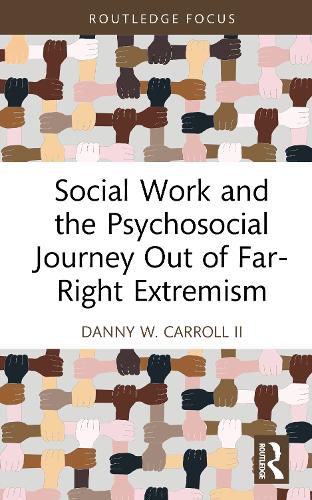Readings Newsletter
Become a Readings Member to make your shopping experience even easier.
Sign in or sign up for free!
You’re not far away from qualifying for FREE standard shipping within Australia
You’ve qualified for FREE standard shipping within Australia
The cart is loading…






Over the last 30 years, domestic far-right extremism has risen to become the greatest threat to peace and safety in the United States. In the last few years alone, racialized, minoritized, and marginalized individuals and communities have been increasingly forced to feel the pain and experience the consequences of domestic far-right terrorism. Supposing academics, community leaders, and elected officials seek to combat the rising threat of far-right extremism in the United States, a greater focus must be paid to the lived experiences of men and women seeking to exit extremist groups.
This study aimed to better understand the psychosocial processes involved in the disengagement and/or de-radicalization journey of former far-right extremists. Additionally, this study sought to understand better the potential role social work could play in the disengagement and de-radicalization of far-right extremists seeking to exit a life of hate and extremism. Charmaz's (2014) grounded theory approach provided the framework for this qualitative study. Semi-structured interviews with 19 former white nationalist extremists recruited through community informants and snowball sampling were used to answer the research question: What are the psychosocial processes involved in the disengagement and de-radicalization journey of former far-right extremists, and how do they develop in society? To date, there has not been a study located utilizing constructivist grounded theory in disengagement and de-radicalization studies. Additionally, a theory of disengagement and de-radicalization has yet to be explored.
This study sought to explore and conceptualize latent social patterns and structures within the disengagement and de-radicalization journey as a means to construct a theoretical frame to better understand one's journey from a life of hate. Study findings emerged from over 3,500 coded items from 18 transcripts. Eight themes emerged from the data, and a theoretical model conceptualizing the psychosocial processes involved in the journey out of far-right extremism is introduced.
$9.00 standard shipping within Australia
FREE standard shipping within Australia for orders over $100.00
Express & International shipping calculated at checkout
Over the last 30 years, domestic far-right extremism has risen to become the greatest threat to peace and safety in the United States. In the last few years alone, racialized, minoritized, and marginalized individuals and communities have been increasingly forced to feel the pain and experience the consequences of domestic far-right terrorism. Supposing academics, community leaders, and elected officials seek to combat the rising threat of far-right extremism in the United States, a greater focus must be paid to the lived experiences of men and women seeking to exit extremist groups.
This study aimed to better understand the psychosocial processes involved in the disengagement and/or de-radicalization journey of former far-right extremists. Additionally, this study sought to understand better the potential role social work could play in the disengagement and de-radicalization of far-right extremists seeking to exit a life of hate and extremism. Charmaz's (2014) grounded theory approach provided the framework for this qualitative study. Semi-structured interviews with 19 former white nationalist extremists recruited through community informants and snowball sampling were used to answer the research question: What are the psychosocial processes involved in the disengagement and de-radicalization journey of former far-right extremists, and how do they develop in society? To date, there has not been a study located utilizing constructivist grounded theory in disengagement and de-radicalization studies. Additionally, a theory of disengagement and de-radicalization has yet to be explored.
This study sought to explore and conceptualize latent social patterns and structures within the disengagement and de-radicalization journey as a means to construct a theoretical frame to better understand one's journey from a life of hate. Study findings emerged from over 3,500 coded items from 18 transcripts. Eight themes emerged from the data, and a theoretical model conceptualizing the psychosocial processes involved in the journey out of far-right extremism is introduced.